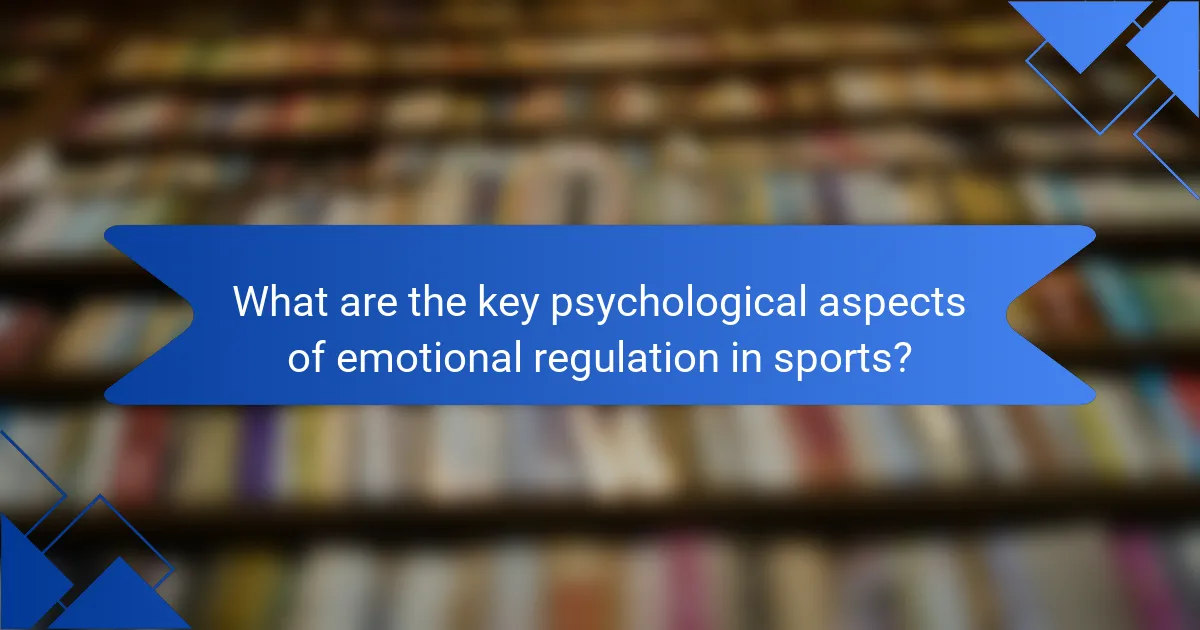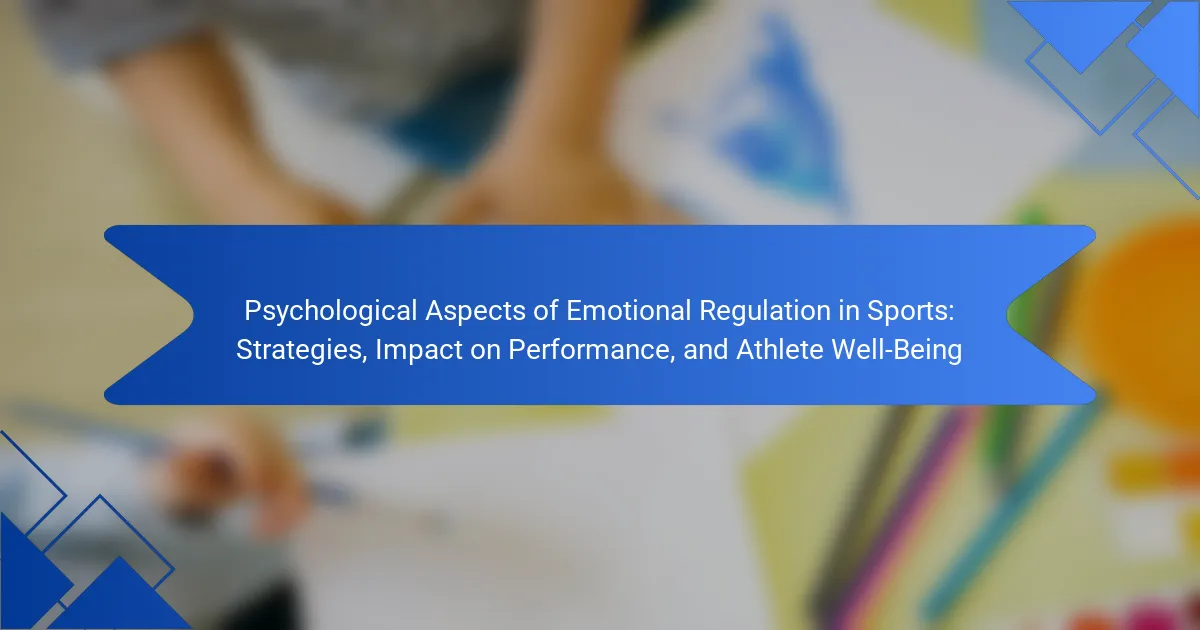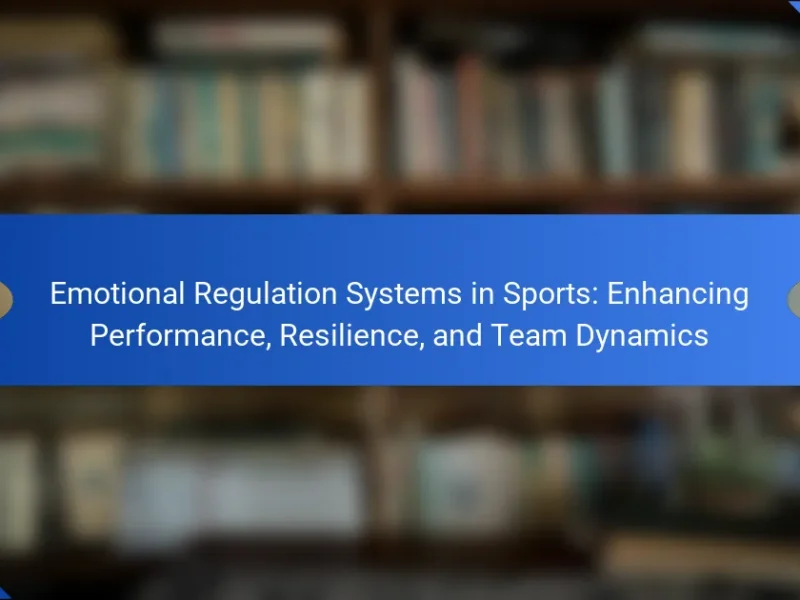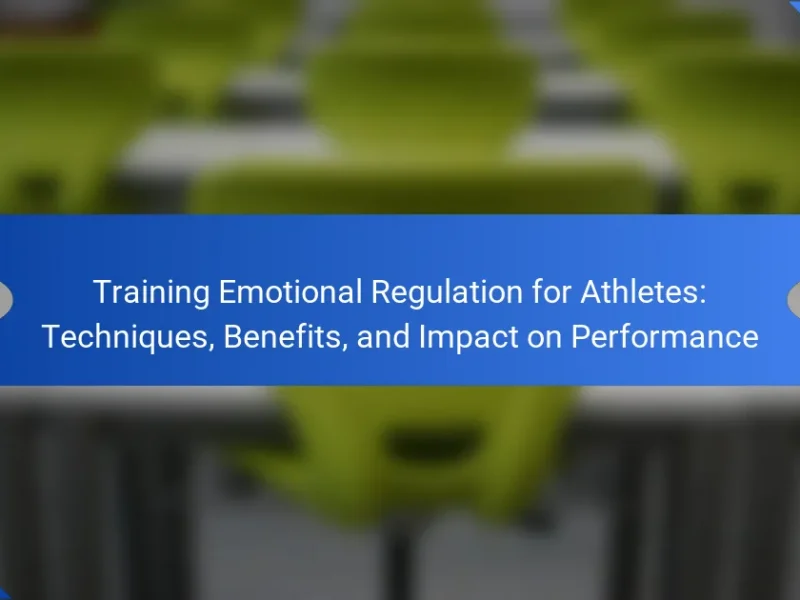Emotional regulation in sports is crucial for enhancing performance and athlete well-being. Key psychological aspects include self-awareness, coping strategies, and emotional intelligence. These skills enable athletes to recognize emotional triggers, maintain focus under pressure, and foster effective communication. Mastering emotional regulation leads to improved performance, reduced anxiety, and greater satisfaction in sports careers.

What are the key psychological aspects of emotional regulation in sports?
Emotional regulation in sports significantly influences performance and athlete well-being. Key psychological aspects include self-awareness, coping strategies, and emotional intelligence.
Self-awareness allows athletes to recognize their emotional triggers, enhancing their ability to manage reactions. Coping strategies, such as mindfulness and visualization, help athletes maintain focus and composure during competitions. Emotional intelligence fosters better communication and teamwork, promoting a supportive environment.
The impact of effective emotional regulation is profound. Athletes who master these skills tend to perform better under pressure, experience lower anxiety levels, and enjoy higher overall satisfaction in their sports careers.
How does emotional regulation impact athletic performance?
Emotional regulation significantly enhances athletic performance by improving focus and resilience. Athletes who effectively manage their emotions can maintain optimal arousal levels, reducing anxiety and increasing motivation. Research shows that emotional regulation strategies, such as cognitive reappraisal, lead to better decision-making and performance outcomes. For instance, athletes employing these strategies demonstrate higher levels of concentration during competitions. Additionally, emotional regulation contributes to overall athlete well-being, fostering a positive mindset that supports sustained engagement in sports.
What strategies are effective for emotional regulation in sports?
Effective strategies for emotional regulation in sports include mindfulness, cognitive restructuring, and controlled breathing techniques. These methods help athletes manage stress, enhance focus, and improve overall performance. Mindfulness promotes present-moment awareness, reducing anxiety. Cognitive restructuring involves reframing negative thoughts, fostering a positive mindset. Controlled breathing techniques regulate physiological responses, calming the nervous system. Implementing these strategies can lead to better emotional stability and increased athlete well-being.
What role does cognitive restructuring play in managing emotions?
Cognitive restructuring significantly aids in managing emotions by altering negative thought patterns. This technique enables athletes to replace irrational beliefs with positive affirmations, enhancing emotional regulation. As a result, athletes experience reduced anxiety and improved focus during performance. Research indicates that cognitive restructuring contributes to better mental resilience, which is crucial for maintaining athlete well-being. Implementing this strategy can lead to a more constructive mindset, ultimately fostering enhanced athletic performance.
How can mindfulness techniques enhance emotional control?
Mindfulness techniques significantly enhance emotional control by promoting self-awareness and reducing stress. These practices help athletes recognize their emotional triggers and respond more effectively. Research shows that mindfulness can lead to improved focus, greater resilience, and better performance. For example, athletes who engage in mindfulness report lower anxiety levels and increased emotional regulation during competitions. This unique attribute of mindfulness fosters a calm mindset, essential for optimal performance.
What are the benefits of visualization for emotional regulation?
Visualization enhances emotional regulation by providing athletes with mental strategies to manage stress and anxiety. It fosters a sense of control, improves focus, and promotes relaxation. Research indicates that athletes who practice visualization report increased confidence and reduced performance-related anxiety. This technique allows for the rehearsal of positive outcomes, reinforcing a constructive mindset during competition. Additionally, visualization can lead to improved emotional resilience, enabling athletes to better handle setbacks and maintain optimal performance levels.
What unique challenges do athletes face in emotional regulation?
Athletes face unique challenges in emotional regulation due to performance pressures, public scrutiny, and the need for resilience. These factors can lead to anxiety, stress, and burnout, affecting both emotional well-being and performance outcomes. Strategies such as mindfulness, cognitive-behavioral techniques, and support networks are essential for managing these challenges. Research indicates that athletes who effectively regulate their emotions experience improved focus and enhanced performance. Emotional regulation is not just beneficial; it is crucial for long-term athlete well-being and success.
How do high-pressure situations affect emotional responses?
High-pressure situations can heighten emotional responses, leading to anxiety or performance enhancement. Athletes may experience increased adrenaline, which can sharpen focus and energy. However, excessive pressure can trigger negative emotions, impacting decision-making and overall performance. Effective emotional regulation strategies, such as mindfulness and visualization, can help athletes manage these responses, promoting well-being and optimal performance outcomes.
What is the impact of social dynamics on emotional well-being in teams?
Social dynamics significantly influence emotional well-being in teams by shaping relationships and communication patterns. Positive interactions enhance emotional support, leading to improved performance and satisfaction. Conversely, negative dynamics can result in stress and decreased motivation. Research indicates that cohesive teams exhibit higher emotional resilience, fostering a supportive environment that promotes individual and collective well-being. Understanding these dynamics is crucial for optimizing team performance in sports settings.
What are the rare emotional regulation techniques used by elite athletes?
Elite athletes utilize rare emotional regulation techniques such as visualization, mindfulness, and biofeedback. These methods enhance focus, reduce anxiety, and improve overall performance. Visualization involves mentally rehearsing scenarios, which can prepare athletes for high-pressure situations. Mindfulness practices, like meditation, help athletes stay present and manage stress effectively. Biofeedback uses technology to provide real-time data on physiological responses, allowing athletes to gain control over their emotional states. These strategies contribute significantly to athlete well-being and performance optimization.
How do professional athletes utilize biofeedback?
Professional athletes utilize biofeedback to enhance emotional regulation and performance. This technology helps them monitor physiological functions, such as heart rate and muscle tension, enabling real-time adjustments to their mental state. For example, athletes can learn to control stress responses, leading to improved focus and reduced anxiety during competitions. Studies indicate that consistent biofeedback training can enhance overall well-being, making it a unique strategy in sports psychology.
What is the significance of emotional intelligence in sports?
Emotional intelligence significantly enhances athletic performance by improving emotional regulation and interpersonal relationships. Athletes with high emotional intelligence can manage stress, adapt to challenges, and maintain focus. This capability leads to better decision-making during competitions and fosters teamwork. Research indicates that emotional intelligence positively correlates with overall athlete well-being, reducing burnout and enhancing resilience. By implementing strategies to develop emotional intelligence, athletes can achieve peak performance and cultivate a supportive team environment.
How can coaches support athletes in developing emotional regulation skills?
Coaches can support athletes in developing emotional regulation skills through targeted strategies. These include teaching mindfulness techniques, promoting self-awareness, and providing constructive feedback. Mindfulness practices help athletes focus on the present, reducing anxiety. Self-awareness training encourages athletes to identify their emotional triggers and responses. Constructive feedback fosters a growth mindset, enhancing resilience. Regular mental skills training sessions can also improve emotional regulation, leading to better performance and overall well-being.
What training programs are available for emotional regulation?
Various training programs for emotional regulation in sports focus on enhancing athlete performance and well-being. These include cognitive-behavioral techniques, mindfulness practices, and biofeedback training. Cognitive-behavioral programs help athletes identify and reshape negative thought patterns. Mindfulness training fosters present-moment awareness, reducing anxiety and improving focus. Biofeedback programs utilize technology to help athletes gain control over physiological responses, enhancing emotional management. These programs are tailored to individual needs, promoting resilience and optimal performance in competitive environments.
How can feedback mechanisms enhance emotional awareness?
Feedback mechanisms enhance emotional awareness by providing athletes with structured insights into their emotional states. This process fosters self-reflection, enabling athletes to recognize and manage their emotions effectively. For example, regular feedback from coaches or peers can highlight emotional triggers, promoting proactive emotional regulation strategies. This heightened awareness can lead to improved performance, as athletes learn to channel their emotions positively. Furthermore, studies indicate that athletes with strong emotional awareness experience greater well-being and resilience, crucial attributes for sustained success in sports.
What common mistakes do athletes make in managing their emotions?
Athletes often make several mistakes in managing their emotions that can hinder performance. Common errors include suppressing feelings, which can lead to increased stress and anxiety. Another mistake is failing to recognize emotional triggers, resulting in unpreparedness during competitions. Over-reliance on positive thinking without addressing negative emotions can create a false sense of security. Additionally, neglecting emotional recovery after events can lead to burnout. Understanding these pitfalls is crucial for enhancing emotional regulation and overall athlete well-being.
What best practices can enhance emotional regulation in sports?
Effective emotional regulation in sports enhances performance and athlete well-being. Key best practices include mindfulness training, cognitive restructuring, and goal-setting strategies.
Mindfulness training helps athletes stay present and manage anxiety. Research shows it can reduce performance-related stress by up to 30%. Cognitive restructuring allows athletes to reframe negative thoughts, promoting resilience. Setting specific, measurable goals enhances focus and motivation, leading to improved emotional control during competitions.
Incorporating these strategies fosters a positive mindset, crucial for peak performance. Regular practice of these techniques can lead to long-term benefits in emotional regulation and overall athletic success.


